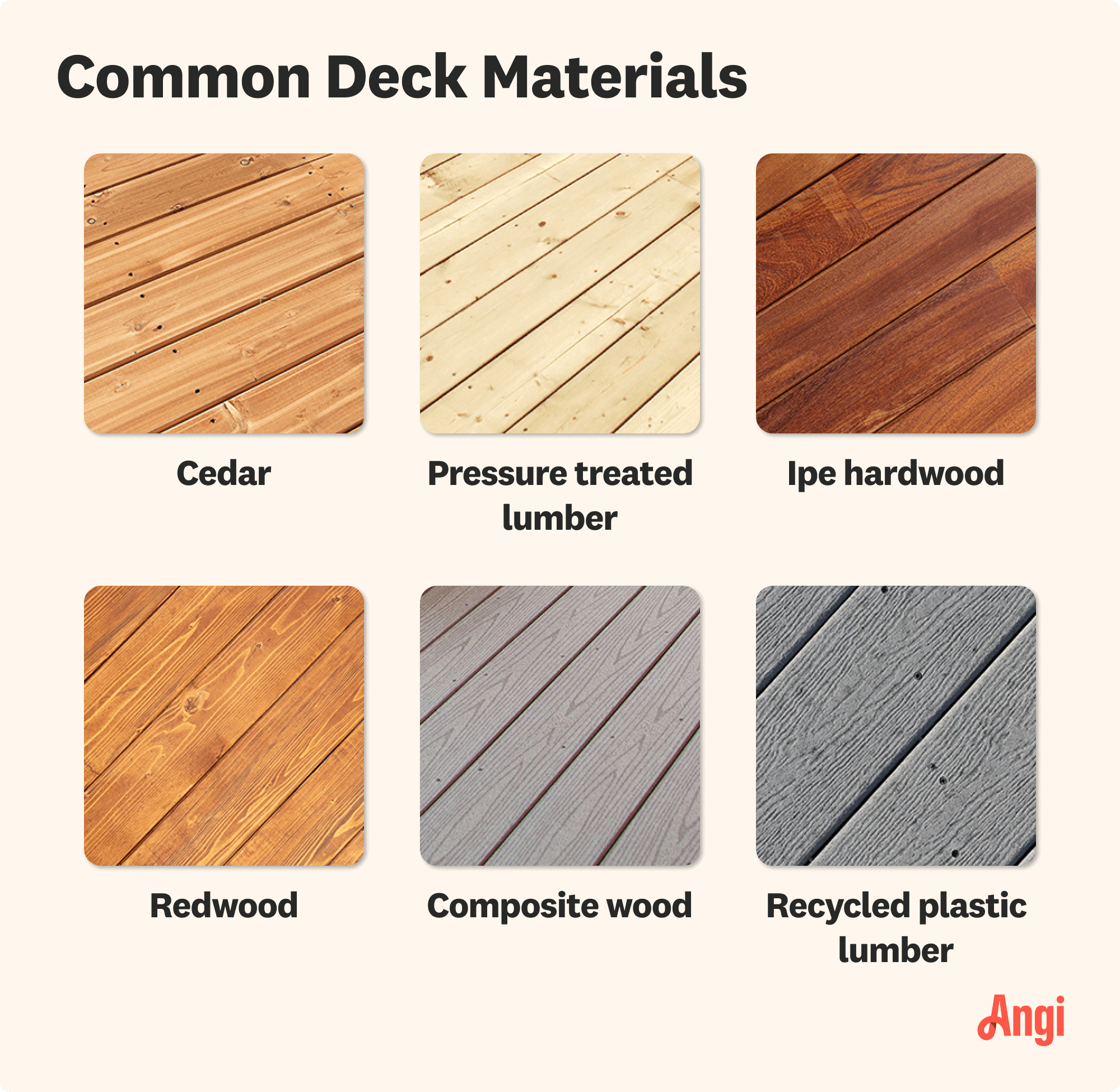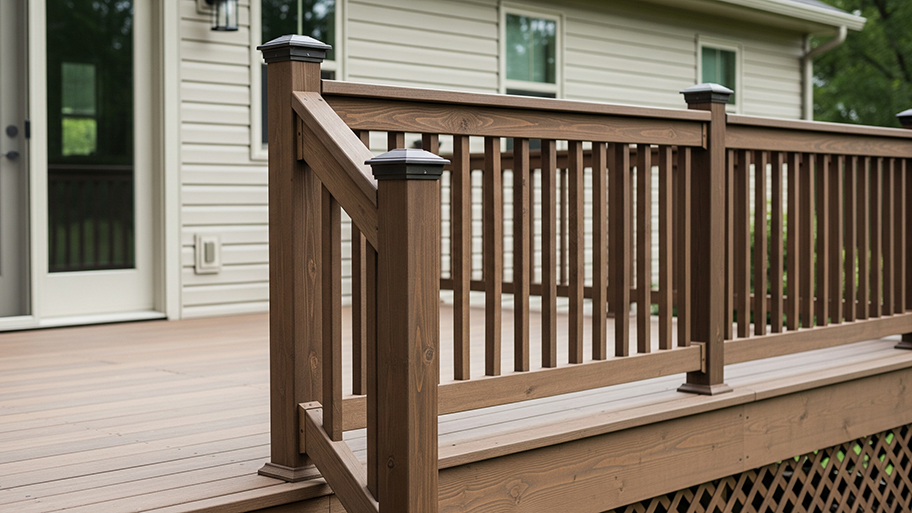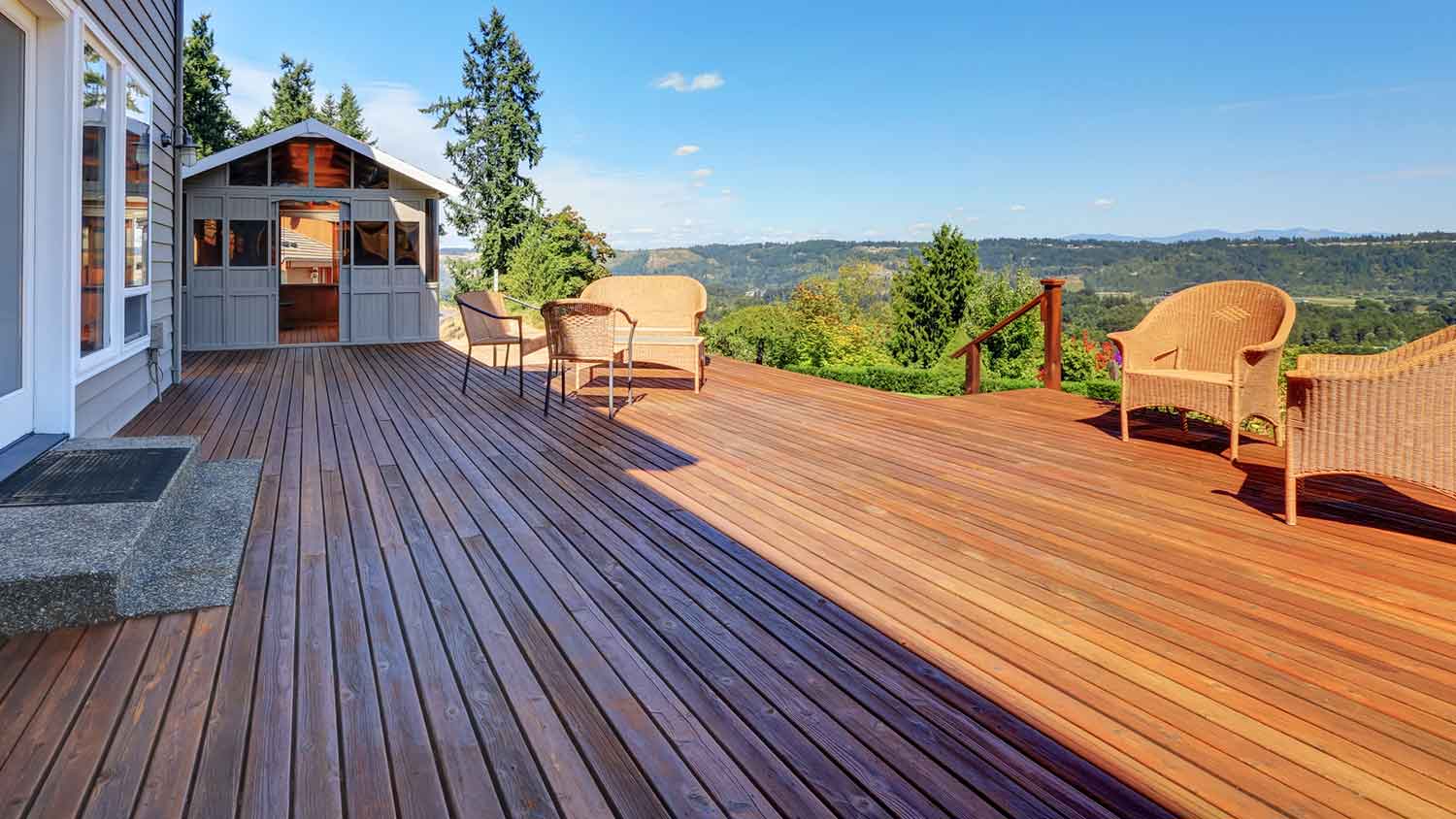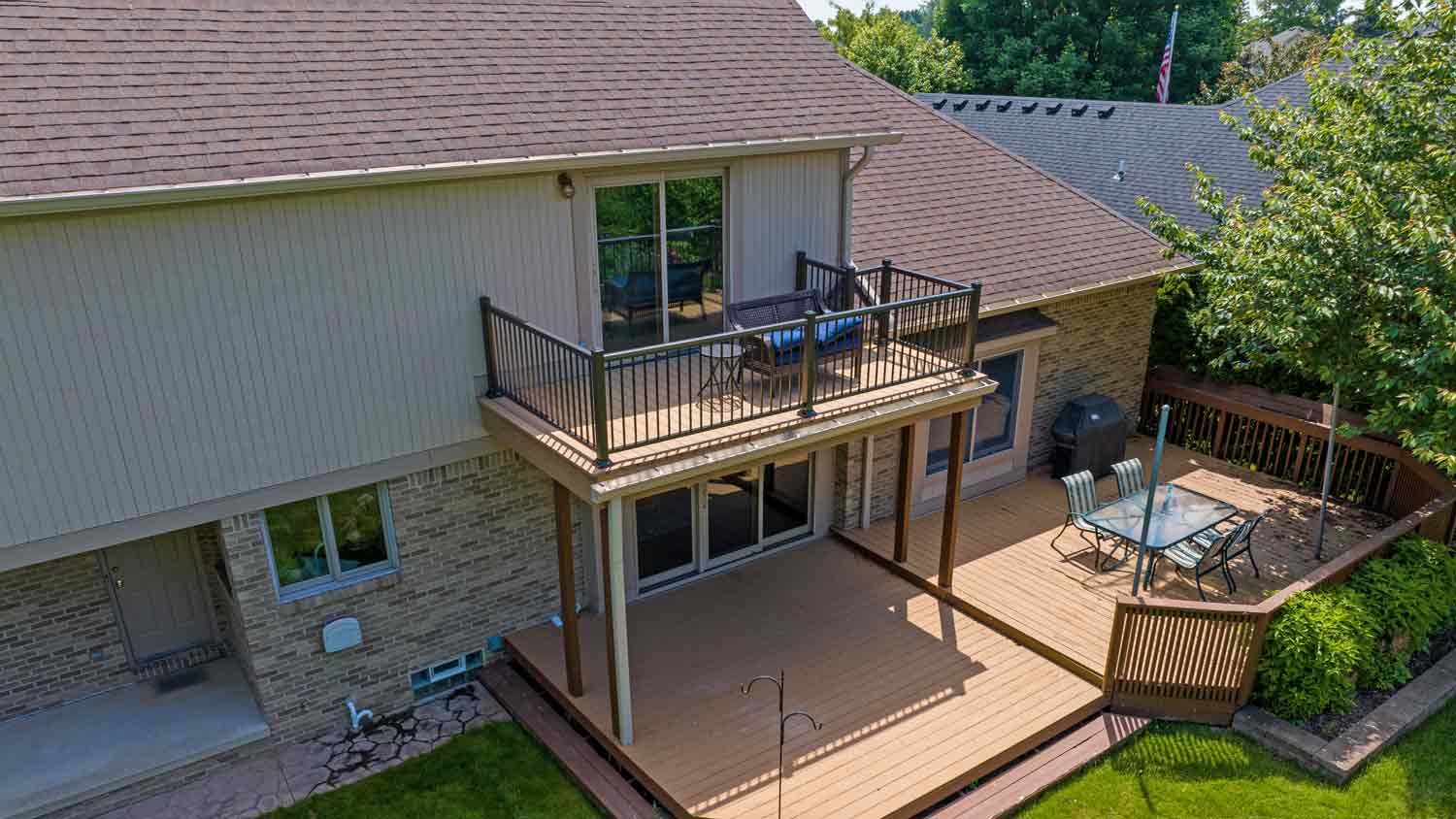
Trellises are structural pieces that add to your garden, but they can also add to your bills. Keep reading to find out how much a trellis costs to build.
Deck and porch service costs depend on your project and location. Check with a local pro for your specific job.
Labor is the largest expense, with pros charging an average of $600 to $1,400 to refinish a 200-square-foot deck.
DIY refinishing can cost $300 to $800, depending on tools and materials.
Repairs are often the biggest add-on expense, ranging from $850 to $3,500, with major structural fixes climbing above $10,000 for heavily damaged decks.
Refinishing delivers strong ROI by extending your deck’s lifespan by 2 to 3 years, improving curb appeal, and saving thousands compared to full replacement.
The average deck refinishing cost is about $980 or $3 to $7 per square foot. The total cost varies widely depending on your deck size, condition, and location. Some small decks cost as low as $500 to refinish, while large, older decks may cost $4,600 or more. Any necessary repairs also add to the deck refinishing cost.
You and your deck have been together through countless barbecues, weekend lounge sessions, and morning coffees. Here’s all that you need to know about budgeting to keep your deck fresh and enjoy it for many years to come.
You should opt for staining if you enjoy a rich, natural wooden look and are keen on saving money. While staining costs less than painting, you'll need to do it more often—every few years—and it's not as protective as a paint job. If you want a long-lasting solution and a pop of vibrant color, painting is the way to go.

Refinishing a deck is well worth the investment. Your deck restoration cost depends on labor and the size and state of your deck. Repairs are another major factor that can quickly tally up your bill. It’s one of the best ways to maintain your deck.
To preserve your deck’s beauty, keep up with regular cleaning, repairing, sealing, and other maintenance work. A local deck refinishing service can give your deck the TLC it deserves.
Professional deck refinishing costs between $3 and $7 per square foot. Here are a few cost estimates based on size:
| Deck Size in Square Feet | Price Range |
|---|---|
| 100 | $300–$700 |
| 120 | $400–$800 |
| 144 | $400–$1,000 |
| 180 | $600–$1,400 |
| 240 | $700–$1,600 |
| 256 | $800–$1,700 |
| 280 | $800–$1,900 |
| 320 | $1,000–$2,200 |
Keep in mind that repairs also play a part in your cost to refinish a deck. A small but mangled deck could end up being more expensive than a large one that’s more structurally sound.
The type of material your deck consists of can affect the cost of refinishing it. However, the differences often lie more in the condition of those materials than in the products themselves. Pressure-treated lumber and softwoods are more prone to having soft spots that need managing during the refinishing process.
That said, if your decking materials have some damage, you can consider painting or solid staining the surface, which can lower the cost of significant repair work. Additionally, for composite or recycled material decks, refinishing with paint is the only option.

Your biggest deck resurfacing cost factor is labor. Professional resurfacing of a 200-square-foot deck could cost between $600 to $1,400. DIY-ing it might cost between $300 and $800, depending on what tools you already own.
You’ll need to do some prep work—or hire a pro to do so—before refinishing a deck to ensure a smooth and durable finish.
| Prep Task | Average Cost |
|---|---|
| Cleaning | $0.40 per square foot |
| Repairs | $850–$3,500 |
| Stripping paint | $30–$50 per hour |
| Sanding | $40–$70 per day |
Professional power washing costs $0.40 per square foot, while renting a power washer costs $70 to $300 per day. This method can help eliminate chipped paint so that you start with a smoother surface. Be careful not to use too much water pressure on your deck. Otherwise, you could splinter your wood. A local deck cleaning company can take this task off your plate.
If you find that the happy pattering of feet loosened your deck over time or that greedy insects have been munching on it, you’ll have to budget for repairs in your deck refinishing cost. The average cost to repair a deck is $2,000, but it can reach $4,000 or even over $10,000 for larger and severely damaged decks.
Removing old paint before you apply a new paint or stain ensures the wood absorbs the product. A deck cleaning agent or stripping solution costs $20 to $60 per gallon. A contractor may charge $30 to $50 an hour to strip the wood for you, but they usually include stripping in their total project price. After you apply the cleaner, allow it to soak in before you sand the surface.
Sanding creates a smooth surface that will accept the new finish evenly. Use a power sander for larger areas and a hand sander for edges and corners. Renting a power sander costs about $40 to $70 per day. You’ll also need to pick up a three-pack of discs for around $5.
Staining a deck can cost $550 to $1,250, while deck sealing will add about $0.50 to $7 per square foot. It might cost more than a simple DIY job, but hiring a local deck staining pro will guarantee a smooth, beautiful application your neighbors will “ooh” and “aah” at.
Deck sealants cost between $20 and $60 per gallon, depending on the type of finish. Water-based sealants can cost twice as much as oil-based sealants. Though they cost double that of oil-based sealants, water-based sealants have a lower life span. Water-based sealants are easier to apply to deck surfaces, however. They also contain fewer volatile organic compounds (VOCs), making them more environmentally friendly.
| Finish Type | Average Cost per Gallon |
|---|---|
| Water-based sealant | $40–$60 |
| Oil-based sealant | $20–$50 |
| Semi-transparent stain | $30–$50 |
| Solid stain | $35–$55 |
| Clear stain | $20-$60 |
Many DIY deck stains come with built-in sealant and cost about $40 per gallon. A gallon covers 200 to 300 square feet, so you might need more than one. For best results, apply with a paint sprayer, which costs around $300. If that price makes you flinch (we feel you), you can rent a paint sprayer for around $100 per day.
Regardless of the finish type, a high-quality finish costs more upfront than a low-quality finish. In the long run, however, you’ll likely save money by investing in a quality finish with a longer life span.
Areas with a higher cost of living will see higher labor costs to refinish a deck. For example, refinishing a deck in Chicago, Illinois is likely to cost more than refinishing a deck in Saint Louis, Missouri.
| City | Average Cost* |
|---|---|
| Chicago, IL | $1,100–$2,300 |
| Saint Louis, MO | $900–$2,000 |
| Saint Paul, MN | $1,000–$2,200 |
| Houston, TX | $1,200–$2,400 |
| Atlanta, GA | $1,100–$2,300 |
| Birmingham, AL | $800–$1,900 |
*For a 200-square-foot deck.
Your deck’s condition could make or break your budget, with costs varying wildly from $300 to $10,000. A deck that is in good condition and only needs cleaning, sanding, staining, and resealing can be DIYed for about $300, while a deck in poor condition may need reparation, sending project costs upward to over $10,000.
Deck restoration costs anywhere from $1,400 to $4,600 on average. Restoring your deck involves repairing and refinishing the deck, which can cost $600 to $1,400 and $800 to $3,200, respectively. The more work the project takes, the higher the price will be.
Before the restoration process, you’ll need a deck inspection for signs of rot, warping, and infestations. If a pest infestation is present, you’ll need to hire a local exterminator to evict any squatters. Structural repairs can get pricey, but they’re absolutely necessary before you can refinish the deck.
The cost to resurface a standard 200-square-foot deck is between $500 and $1,400 or around $1,000 on average. Included in this price is sanding and repainting or staining the deck. This price depends on the type of resurfacing materials and the size of your deck.
There are a few very good reasons to refinish your home's deck area. For one, refinishing your deck will increase its lifespan by at least two to three years. It will also prevent splinters and cracks that can hurt bare feet. A nice refinishing will also, of course, improve your deck's appearance and, therefore, your home’s curb appeal. Finally, refinishing your deck is more cost-effective than fully replacing a worn-out-looking deck, which can run $4,500 and $18,000.
Refinishing costs between $900 and $2,700 on average, while a full deck replacement costs an average of $7,800, so you can save money by opting to refinish your deck rather than replace it. However, whether you should largely depend on the deck’s structural integrity. If your deck's frame is solid and the wood isn't rotting or warped, refinishing can restore its appearance and extend its life for a fraction of replacement costs.
On the flip side, if your deck has significant rot, extensive insect damage, major warping or sagging, or if more than 40% of the boards need replacement, investing in a new deck is safer and more cost-effective long term. Age is another factor—wood decks over 20 years old often reach a point where repairs and refinishing become a money pit, making replacement the smarter financial choice.
If you decide to DIY your deck, you could save between $300 and $600 on average. However, refinishing a deck on your own is challenging. You’ll likely invest great energy and time into the project, even if you save money on labor costs. If you don’t already have experience refinishing decks—or the deck is in poor condition—your best bet is to work with a professional to restore and refinish your deck.
Here’s a breakdown of the costs for refinishing a deck yourself.
| DIY Factor | Average Cost |
|---|---|
| Basic tools and supplies | $150–$200 |
| Paint sprayer | $100–$300 |
| Power washer | $50–$250 |
| Stain and sealant | $20–$60 per gallon |
| Sander | $40–$70 per day |
| Deck inspection | $25–$200 |
Hiring a deck refinishing service near you costs anywhere from $600 to $1,400, depending primarily on the condition and size of your deck. Working with a pro helps ensure that your deck is safe, comfortable, long-lasting, and attractive for years to come.
Here are a few ways you can save on the cost to refinish a deck:
Do prep work, like minor repairs and sanding yourself.
Inspect your deck consistently and make regular repairs to keep it in better shape for longer.
Choose a cost-effective stain with a long lifespan.
Get at least three quotes from local contractors to compare costs and value.
Use a grease catcher with your grill, as grease stains are difficult to remove from deck boards.
Clean your deck at least once a year by sweeping leaves and dirt to avoid wood damage.
Clean grease, food, and drink spills immediately to avoid permanent staining.
Redirect downspouts away from the deck to prevent moisture damage and rot.
Home is the most important place on earth, which is why Angi has helped more than 150 million homeowners transform their houses into homes they adore. To help homeowners with their next project, Angi provides readers with the most accurate cost data and upholds strict editorial standards. We extensively research project costs to develop the pricing data you see, so you can make the best decisions for you and your home. We rely on reputable sources, including the U.S. Bureau of Labor Statistics, academic journals, market studies, and interviews with industry experts—all to ensure our prices reflect real-world projects.
Want to help us improve our cost data? Send us a recent project quote to [email protected]. Quotes and personal information will not be shared publicly.
From average costs to expert advice, get all the answers you need to get your job done.

Trellises are structural pieces that add to your garden, but they can also add to your bills. Keep reading to find out how much a trellis costs to build.

The average cost of a deck railing depends on size, type, material, and labor in your area. Check out this guide to determine what works for your budget.

Discover redwood deck costs, including average prices, installation factors, labor rates, and tips to save on your new deck project.

Under-deck drainage costs can be pricey. Your final quote will depend on labor, materials, and the size of your deck. Start budgeting with this guide.

Compare pergola builders, carpenters, and landscapers to decide who to hire for a pergola or trellis. Learn the pros, process, and smart next steps.

Lattice panels can give your home a polished look and hidden storage. Learn how to install lattice under a deck or porch with this step-by-step guide.